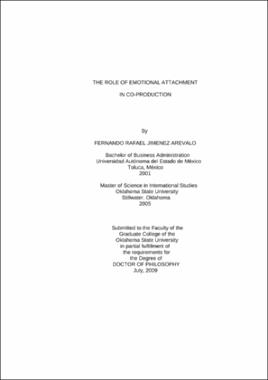| dc.contributor.advisor | Voss, Kevin E. | |
| dc.contributor.author | Jimenez Arevalo, Fernando Rafael | |
| dc.date.accessioned | 2013-11-26T08:25:41Z | |
| dc.date.available | 2013-11-26T08:25:41Z | |
| dc.date.issued | 2009-07 | |
| dc.identifier.uri | https://hdl.handle.net/11244/6817 | |
| dc.description.abstract | Scope and Method of Study: Drawing from an exhaustive literature review, I find that coproduction which is the customer's hands-on participation in making an object and emotional attachment (EA) which reflects an emotional bond connecting an individual with another entity, share common antecedents and consequences, thus suggesting that they are related. This dissertation extends the emotional attachment literature by: (1) examining the effects of consumer co-production on the formation of EA, and (2) examining the role of task enjoyment in the reduction of EA from co-production. Based on related theories, meaningful relationships between EA and co-production are proposed and hypotheses were stated. The hypotheses were tested by conducting two experimental studies. Study one explores the role of EA created by co-production and its effect on the willingness to dispose of the object (WTD). EA is proposed to mediate the relationship between customer co-production and WTD. Also proposed is the moderating effect of meness; which refers to the level of association of an object and the self. I test these relationships using a 2 (co-production: low, high) x 2 (Meness: low high) between-subjects experimental design. In Study Two, I investigate the impact of task enjoyment in the formation of EA due to coproduction. I argue that by manipulating autonomy and creativity in the task, WTD increases due to the mediation of task enjoyment and the reduction of EA to the object. I test these relationships using a 2 (autonomy: low, high) x 2 (Creativity: low high). Both experiments were conducted in a lab setting where participants were randomly assigned to one of the conditions to engage in a coproduction exercise. | |
| dc.description.abstract | Findings and Conclusions: | |
| dc.description.abstract | The results of this dissertation add to the literature of emotional attachment and customer co-production. The findings show that co-production and emotional attachment are related when there is a high level of task enjoyment. This emotional attachment in turn reduces the willingness to dispose of an object. However, the results should be taken with caution since there are major generalizability and measurement limitations in the study. More research is needed to understand how customers value their participation in the production of their goods. | |
| dc.format | application/pdf | |
| dc.language | en_US | |
| dc.rights | Copyright is held by the author who has granted the Oklahoma State University Library the non-exclusive right to share this material in its institutional repository. Contact Digital Library Services at lib-dls@okstate.edu or 405-744-9161 for the permission policy on the use, reproduction or distribution of this material. | |
| dc.title | Role of emotional attachment in co-production | |
| dc.contributor.committeeMember | Fang, Xiang | |
| dc.contributor.committeeMember | Suter, Tracy A. | |
| dc.contributor.committeeMember | Zablah, Alex R. | |
| dc.contributor.committeeMember | Pappas, James M. | |
| osu.filename | JimenezArevalo_okstate_0664D_10398.pdf | |
| osu.accesstype | Open Access | |
| dc.type.genre | Dissertation | |
| dc.type.material | Text | |
| dc.subject.keywords | co-production | |
| dc.subject.keywords | consumer behavior | |
| dc.subject.keywords | emotional attachment | |
| dc.subject.keywords | endowment | |
| dc.subject.keywords | mere touch | |
| dc.subject.keywords | valuation of goods | |
| thesis.degree.discipline | Business Administration | |
| thesis.degree.grantor | Oklahoma State University | |
